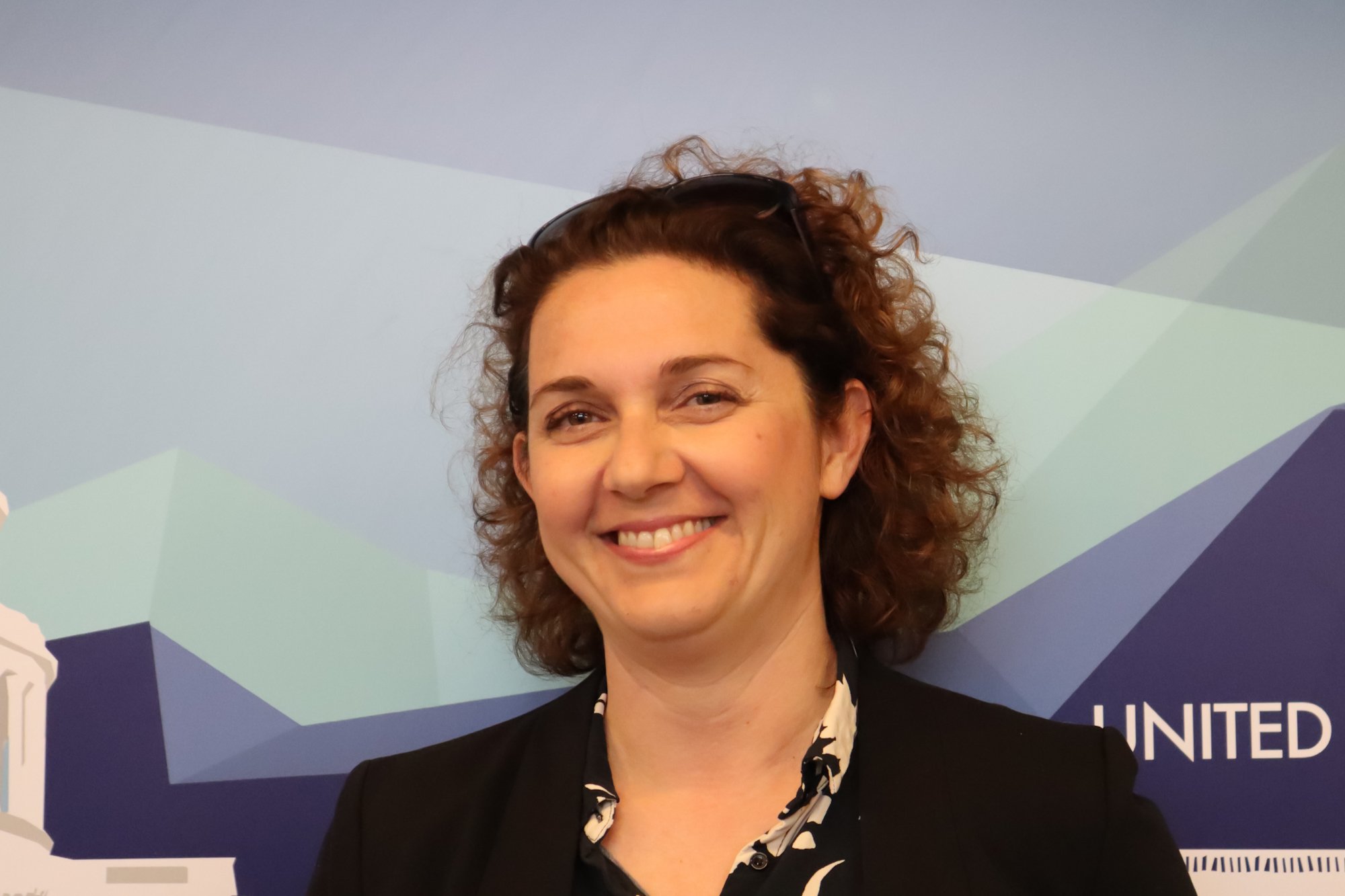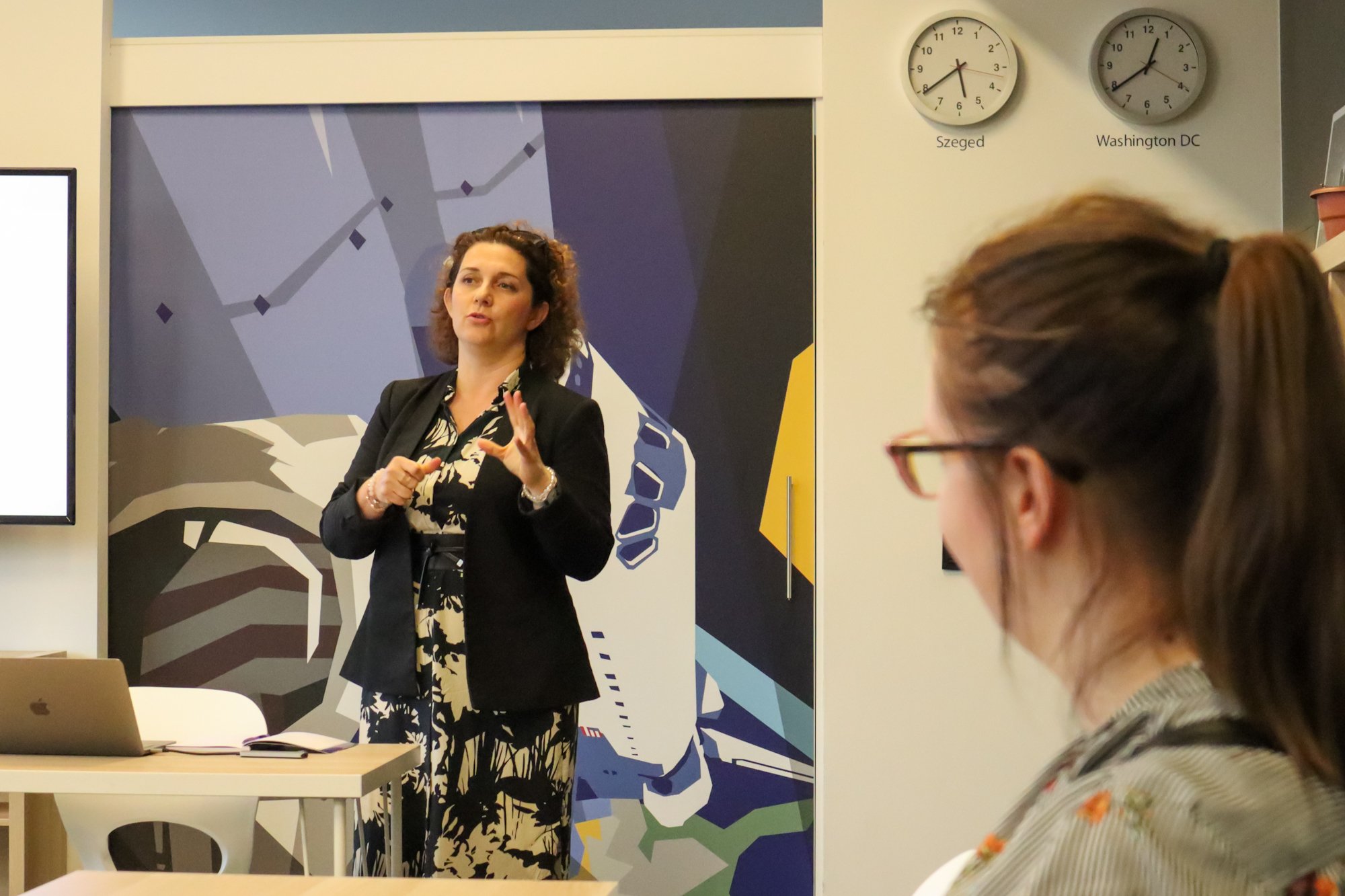Helping entrepreneurs reinvent themselves — interview with Mónika Fischer mindset coach
Mónika Fischer is a Hódmezővásárhely-based mindset coach and mentor. We met at American Corner Szeged, where she held two presentations during the Women Lead program series in English.
What inspired you to become a mindset coach and mentor, and what led you to pursue this path?
Initially, I wanted to find a methodology for my English lessons, because I wanted to find a framework that validated my focus on communication and self-confidence.
I came across coaching and initially used it to teach English as a second language or foreign language. This was in 2014 and then as I dived deeper into coaching I realized that this is something I want to do, it is something that aligns with my personality.
In 2019, after years of self-training and reading about the method I started my first coaching course. Since then I completed many informal and one formal education in Business Coaching but it is the practice of everyday coaching that is the real training.
How do you approach helping entrepreneurs reinvent themselves, and what are some common challenges they face in the process?
There are two main ways I work with entrepreneurs. I work with them individually in a coaching process that has four weekly sessions. This intensive work allows for great progress and sometimes for a decision to go back to the original workplace because entrepreneurship seems too overwhelming. But any decision is better than indecision.
The other process is 4×4 group coaching, in which four women meet weekly for four weeks. This is a method unique to us, my colleague and me. We provide female founders with a double perspective — I am concerned with the bugs in thinking, and my colleague with the bugs in systems and workflows within the company. Namely, one does not work without the other — if an entrepreneur's mindset is all set, but the tasks and responsibilities are not straightforward, it is as big of a problem as when the reverse is true.
Twice a year we also organize a weekend-long retreat where our coachees not only reinvent themselves but redefine and reposition themselves.
All of the women entrepreneurs that we work with face one big challenge, regardless of the income/turnover or size of the company: lack of community and supporting environment. Beginners usually are not aware of what the next step should be. Or they might not have the necessary knowledge, skills, or network to bring their company to the next level.
What motivated you to start your podcast, Cup of Coaching, and what topics do you cover on the show?
The podcast was born from the idea of providing women entrepreneurs with a platform and a safe place to experiment. Namely, especially in the beginning, female entrepreneurs hide behind the brand. They do not feel comfortable enough to show up and speak, so I thought if they don't have to do it on their own, if there is somebody asking the questions, then it might be easier for them.
The other part of the motivation is that I have a deep-rooted affection for radio and recently for podcasts. I worked for a local radio station in my hometown for a while and fell in love with the power of sound and voice.
How do you incorporate different languages and cultures into your coaching and workshops, and what benefits do you see in doing so?
That is a very good question. I would like to incorporate my three languages in all the workshops, coaching, and mentoring I do. I've held some of the Woman Lead and Intercultural Communication workshops in English but I don't often have the opportunity to do that so I mainly work in Hungarian. I would however be very glad if I could work and present in English more. I see the benefit of only using English as the conveying language and also serving as a bridge between foreign students, expats, and Hungarians living and working in Szeged.
To keep my Serbian afloat I have joined a few communities in Serbia and Croatia and in the latter one I will be presenting in Serbian on Monday to a community of over ten thousand people.
What advice would you give to someone struggling to find their passion or purpose in life?
Every time someone talks about passion and purpose it is a cringe moment for me because I think many people don't start to perceive dreams because they don't have an explicit passion or they don't feel they have an explicit purpose in life. So in this respect, I agree with Elizabeth Gilbert, who says that there are two types of people, jackhammers and hummingbirds.
Jackhammers are the ones with an explicit purpose and passion, but they're quite annoying because when they are in that passion mode, they are unaware of anything else. Hummingbirds are social creatures. They are the ones flying from flower to flower and they cross-pollinate ideas, so they bring someone's idea who is maybe incapable of executing it to somebody else who does not have ideas, but is a very good executor.
Consequently, I advise people who do not have a clear idea of what they are good at to just start doing what they like doing. Fishing, drawing, talking to people, cooking, knitting, walking, reading, anything really. Passion and purpose may come as a consequence and not be the reason why you do something.
I have worked with teenagers since 2017 and now even my own kids are stepping into puberty. Choosing a career or profession is almost always stressful for the same reason — they believe they should know what they want to be when they step into the labor market.
How do you stay motivated and inspired as a coach and mentor, and what strategies do you use to avoid burnout?
Coaching is a very inspiring profession in itself (although I have been quoted saying that it is not a profession but rather a tool, a method to be applied to any profession). So my inspiration and motivation come from podcasts from international coaches and businesses, mentors, and from having a work-life balance that prioritizes life, i.e. my family.
What are some common misconceptions or myths about mindset coaching, and how do you address them with your clients?
There are misconceptions about coaching in general. The most common one is that we are "almost" psychologists, but not quite. The other common one is that we give people advice on how to lead their lives or businesses. The latter are consultants or mentors.
Coaches are not advisors, they aim at eliciting knowledge or skill from the coachee rather than teaching them or advising them.
Obviously, when the coachee lacks that particular knowledge or skill there are ways to teach the coachee, but these are usually in the form of workshops, training, or online courses.
And as for mindset coaching in particular, some would argue all coaches are mindset coaches. And I would agree. I emphasize this in my description because I offer a different perspective and point of view on every aspect of their life. Also, I use mindset as a verb: set your mind to serve you.
How do you measure the success of your coaching and mentoring programs, and what indicators do you use to evaluate their effectiveness?
Another excellent question and I really love it because it is thought-provoking. We do not emphasize money and doubling their income because it is almost impossible to measure the benefit of coaching in this way. First of all, it is the coachee that does the work at the end of the day. Secondly, some ideas come to fruition months after the coaching sessions and are not a direct consequence of it.
However, there are immediate benefits like greater confidence, more ideal clients, better business partners and suppliers, better systems and well-defined workflow, and a mindset shift that leads to making decisions more quickly and working more efficiently.
There are also some interesting "side-effects" of the 4x4 group coaching. The women become better at pitching, selling, and presenting in general, they learn how to contribute to a community, and they learn how to lobby for their interests.
The above might seem trivial at first, but years and decades of conditioning can prevent people from doing these things well at the beginning of their entrepreneurial path.
What are your favorite workshop topics?
At the moment I'm very happy and lucky to actually be giving workshops on topics that I am interested in, these are intercultural communication, and women and their relationship with power and money (within the Women Lead program).
What are your future plans and goals for your coaching and mentoring work, and how do you see it evolving in the coming years?
My future plans are only for this year because of recent obstacles both at micro and macroeconomic levels. But my dreams and goals are far-reaching.
In an ideal world, mindset coaches are ground zero in business development and coaches in general are the go-to people for so-called quick fixes and smart goal setting.
I believe mindset is a muscle and therefore needs training like any other muscle. The more people realize coaching is a routine that can be done daily, weekly, and monthly, they can adopt it whenever they have an obstacle in their life.
Photos: Szilvia Molnar / Szegedify

